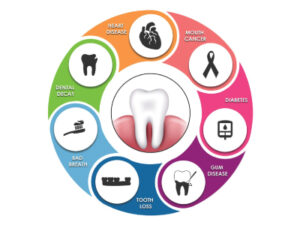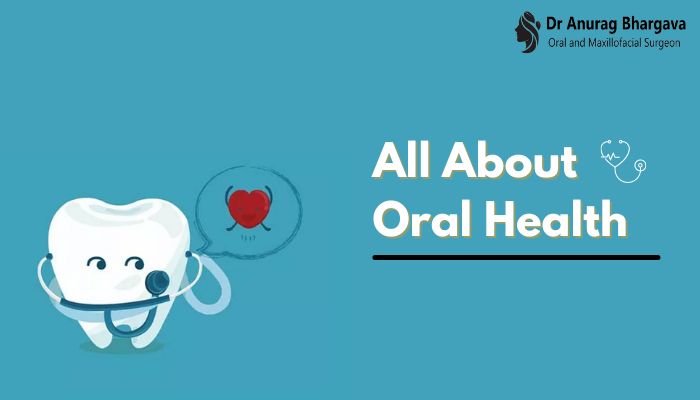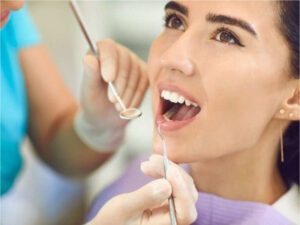We bet you couldn’t devour all your favorite foods without a set of healthy teeth. But how do you keep them looking and feeling perfect? Let’s take a look on the aspect of Oral Health.
Why is Oral Health Important?
You can’t talk about health and leave out your teeth. With poor oral health, come cavities and gum disease. It could also pave the way for cancer, diabetes, and heart disease. WHO says almost all adults have at least one cavity, and around 30% people aged 65-74 have lost all their natural teeth.
Good oral hygiene goes a long way, and starting early will make it easier to avoid costly dental procedures and long-term health issues.
Common Dental Problems
These are a few warning signs of deteriorating oral health:
- Persistent ulcers and sores in the mouth
- Toothache or pain
- Chronic bad breath
- Bleeding or swollen gums after brushing
- Sensitivity to hot/cold beverages
- Receding gums
- Loose teeth
- Broken teeth
- Pain when chewing/biting
- Clicking jaw
- Dry mouth

..And here are a few dental problems:
- Cavities (caries/ tooth decay)
- Gingivitis (inflammation of the gums)
- Periodontitis (serious gum infection)
- Broken teeth (from an injury, chewing on hard food, or grinding the teeth at night)
- Sensitive teeth (pain and discomfort after having hot/cold food and beverages)
- Oral cancer (cancer of the gums, tongue, lips, cheek, floor of the mouth, or the palate)
Causes of Oral & Dental Problems
The normal flora of the mouth has bacteria, viruses, and fungi in small quantities. But when you eat too much sugar, it lets acid-producing bacteria thrive in your mouth. The acid dissolves the enamel of your teeth and causes cavities.
Ever noticed a sticky, yellow film coating your teeth? Bacteria can thrive in this. Gradually, plaque hardens and travels down your teeth if you fail to maintain proper oral hygiene, and then leads to gingivitis (inflammation of your gums). Inflammation can cause your gums to recede (move away from your teeth), leaving pockets for pus to accumulate and cause periodontitis.
Good Oral Hygiene Habits
To keep your teeth healthy:
- Brush at least twice a day with fluoride toothpaste (but not aggressively)
- Floss daily
- Cut (or reduce) sugar out of your diet
- Eat fruits and vegetables
- Use a mouthwash
- Drink more water; drink fluoridated water
- Avoid tobacco and smoking
- Limit alcohol
- Have your teeth cleaned by a professional every 6 months
Oral Health for Children
If you have children, it's essential to teach them proper oral hygiene habits. The most common among preschoolers is tooth decay. Nearly 10%, 28%, and 50% children have developed at least one cavity by ages 2, 3, and 5, respectively.
And while baby teeth do eventually fall out, you don't want cavities because they can affect permanent teeth as well. Start practising dental hygiene as soon as your baby gets his first tooth. Here’s what to do:
- Teach him good dental habits and make it a part of his routine. Make sure he gets all the plaque and keep monitoring any signs of a problem.
- Make available a small toothbrush of his choice with soft bristles. Switch out toothbrushes every 3 months.
- When he’s a baby, a smidge of toothpaste (without fluoride) will do. By age 3, he should be using a pea-sized amount of toothpaste in a flavor of his liking. Make sure to use fluoride toothpaste as it is shown to reduce cavities in both, primary and permanent teeth. Also find out if your water contains fluoride.
- Teach him not to swallow the toothpaste. Encourage him to clean all his teeth inside and out. Make sure he doesn’t forget his tongue. Your dentist can show him the right way to brush his teeth.
- Time him to brush his teeth for 2 minutes or to a favorite song.
- Teach him to brush his teeth twice a day. At night, he should brush his teeth after dinner.
- Reward him for brushing his teeth nicely- with healthy treats.
- Avoid feeding him too much sugar as sugary food like toffee and gum is sticky, and can lead to cavities. Don't let him go to bed with his sippy cup, and check his teeth for deposits after each sugary treat.
- Regular visits to the pediatrician will ensure any signs of damage in his teeth do not go unnoticed. It will also make sure that all his teeth are coming in normally.
- One thing to keep mindful of is the habit of sucking on their thumbs. If your child doesn’t stop after the age of 4, it may interfere with proper teeth alignment.
Now you know why oral health is so important. So remember to take good care of your teeth. After all, you don’t have to brush your teeth, just the ones you want to keep!


